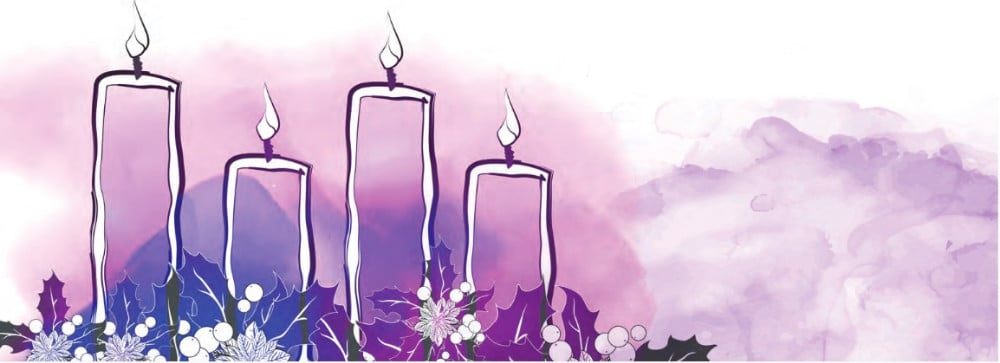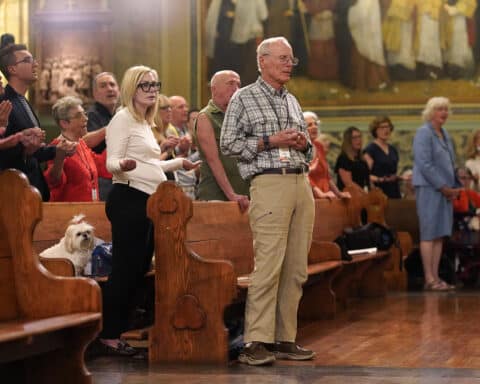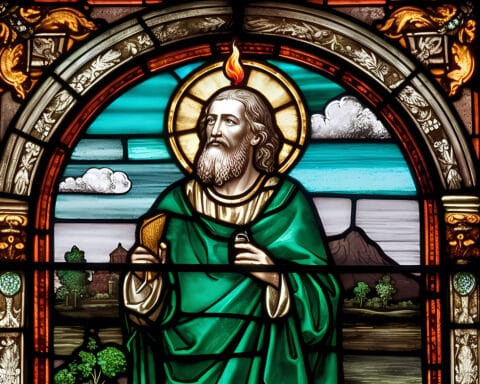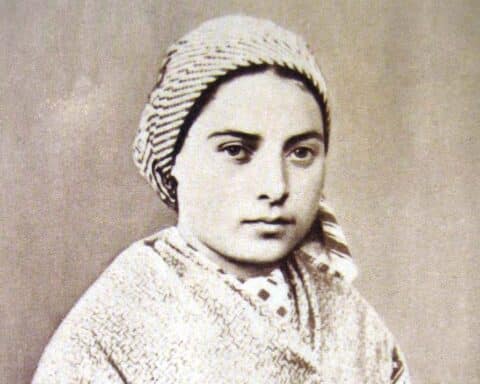The placement of most saints’ feast days has less to do with the season and more to do with the date of their death. But the Spirit works through that, too, and often the lives of the saints have particular messages that might be needed around their feast day. This Advent, get to know a few saints who are celebrated this season and whose stories might be just what you need to make this a sacred time.
Dec. 5
Blessed Nicolas Steno
For peace when we’re pulled in every direction
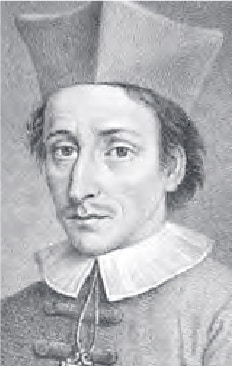
Though Advent ought to be a time of stillness and peace, many of us find ourselves running frantically from one event to another, needing to bake and shop and plan and write and call and decorate and perhaps also pray. And while there’s great wisdom in deliberately making space for silence during Advent, there are other moments when we need to trust that God is at work even in the busyness, that our schedules can be full without being frantic.
Blessed Nicolas Steno (1638-86) could not focus. He wanted nothing more than to focus on the study of medicine, but he kept getting distracted — and then hyperfocusing on some new discipline.
It drove him nuts, to the point that he wrote, “I pray, thee, oh God, take this plague from me and free my soul of all distraction, to work on one thing alone, and to make myself familiar with the tables of medicine alone.”
And God said no.
He could have taken away Steno’s distraction and hyperfocus (a pattern that might suggest that Steno had ADHD, though of course he lived long before such a diagnosis would have been made). But if God had answered Steno’s prayer, Steno would never have devised the laws of stratigraphy that are still in use today. He wouldn’t have essentially invented geology or laid the groundwork for paleontology. He wouldn’t have developed the first law of crystallography.
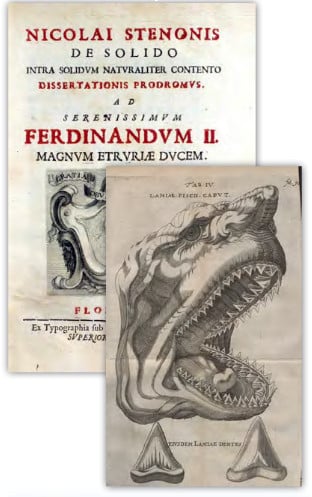
Nicolas Steno is such a brilliant scientist that the NASA website has a 6-page biography about him — all because he was willing to trust God in the midst of all the distractions of his complicated life.
This Advent, it’s so important to make time for silence and stillness and deep prayer. But it’s also important to honor the actual life you have, to praise God in the midst of the distractions and seek him in the frantic busyness. On the feast of Blessed Nicolas Steno, take particular time to ask God to guide your overfull life and to make his love known in the midst of it all.

Dec. 8
St. Noël Chabanel
For help embracing difficult or unpleasant situations
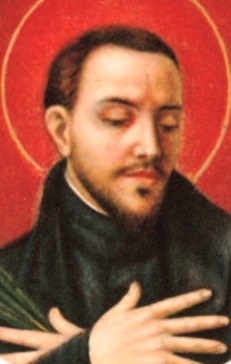
Advent can be a time of great joy, marvelous foo, and real connection with those we love. It can also be a time of awkward silences, unnecessary conflict and awful family recipes that should be laid to rest. It can be a time of frustration over the futility of our attempts to converse pleasantly with those we only see at the holidays. At such a time, many of us need miraculous intervention to keep us from complaining all December long. Enter St. Noël Chabanel (1613-49), a famously ineffective missionary with a deep distaste for the life and customs of the people he served.
As a young Jesuit, Father Noël was a professor of rhetoric. But he longed to preach the Gospel to people who had never heard it. In 1643 he sailed for Canada; with his rumored talent for languages, he was expected to be a great success.
He couldn’t learn a word of Huron. Years of effort resulted in a priest who could dispense sacraments but not preach, who could baptize but not evangelize. Of what use was a missionary priest who could serve only the already converted?
Worse, Father Noël soon discovered that his initial culture shock was never to wear off. Despite his best efforts, he was revolted by every element of Huron culture: food, clothing, housing, everything.
He wasn’t the only European who felt that way. But Father Noël refused to demand that the Hurons accommodate him. He didn’t require European food. He didn’t expect people to learn French.
Father Noël understood that the problem was not with native culture but with him. So he vowed to stay, to live as they lived. He understood that he’d come to preach the Gospel of Jesus Christ, not the gospel of European culture. And though he couldn’t preach, he could stay. He could celebrate Mass and love his people. He could try not to be a burden. He could be grateful for their hospitality and embrace their culture, however hard it was for him.
Father Noël was eventually martyred by a disgruntled apostate. But he’d spent six years being martyred before that, dying to himself, to his preferences, to his ideas of what was appropriate or delicious or normal.
St. Noël Chabanel is a beautiful intercessor for healthy evangelization and respect for other cultures. He’s also a great friend at times when you feel you just can’t endure another day of unappetizing meals or uncomfortable silences or unpleasant interactions — an all-too common experience at family gatherings or company parties leading up to Christmas. Through the intercession of St. Noël Chabanel, may we love those we don’t understand and persevere through irksome situations, especially this Advent.

Dec. 9
St. Gorgonia
For those seeking holiness in ordinary lives
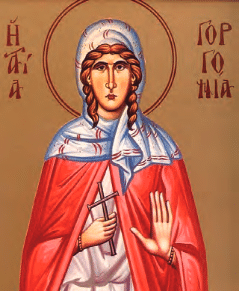
Advent is a time of intense preparation, often more material than spiritual. Those who carry most of the load of shopping and planning and baking and cleaning and scheduling can easily feel unseen and taken advantage of. And while it’s important to discuss this with the ones we love and to ask for help, it can also help to turn to saints who may similarly have felt unseen while other members of their family were given plenty of recognition.
Dec. 9 is the feast of St. Gorgonia (d. 375), the rarely-mentioned sister of Church Father St. Gregory Nazianzen. But it wasn’t just Gregory who was a saint; their only other sibling (St. Caesarius) and their parents (St. Nonna and St. Gregory Nazianzen the Elder) are honored as saints as well. Nonna and Gregory were the parents of saints, Gregory was a bishop and Doctor of the Church, and Caesarius was a politician and a doctor at the Roman emperor’s court. It would have been easy for Gorgonia, consumed by her work in caring for her five children, to have envied the remarkable lives of her brothers and even the honor shown to her parents by the whole community.
But Gorgonia knew that holiness doesn’t come from comparison, so she focused on faithfulness in her particular vocation. And when she died at age 38, her brother the bishop eulogized her in such lavish terms that all who had overlooked the humble young mother began to realize that her ordinary holiness had been quite extraordinary. Gregory spoke of her modesty, her wisdom, her generosity, of the ways in which she fulfilled the words of Solomon in Proverbs 31. He said nothing of miracles or mysticism, of great feats of intellectual acumen or hordes converted to Christ. Instead, he spoke of the way her example brought her husband to Jesus, of the model she was to all believers, male and female alike. He told of her remarkable devotion to prayer that put other Christians to shame, of the purity of her heart that surpassed even that of consecrated men and women.
In the ordinary way of things, we shouldn’t know Gorgonia’s name; if even the names of her two bishop sons have been lost to us, why would Gorgonia survive? The name of Gregory might have come down to us. Caesarius, too. Even Nonna and Gregory the Elder might be known to us because of their connection to their sons. But the fame of Gorgonia, the fact that to this day churches (if not babies) are named for her is due to a peculiarity of the Christian life: that in Christ, it is not better to be rich, famous, brilliant or successful. In Christ, the humblest of people with the humblest of tasks can reign with starry crowns because they did ordinary things with great love.
Dec. 9
St. Juan Diego
For those days when we “don’t have time” for prayer
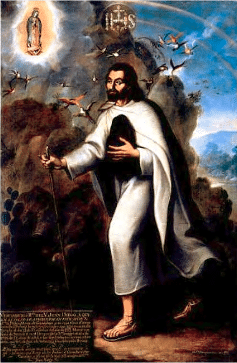
Most American Catholics know the story of St. Juan Diego Cuauhtlatoatzin (1474-1548), the old Indigenous farmer to whom Our Lady of Guadalupe appeared. He saw her four times, this mestiza woman dressed like an Aztec goddess; the final time, she offered proof of her presence through Castilian roses miraculously blooming in Mexico in December. But the proof was even more marvelous than that, as Juan Diego learned when he opened his rose-filled cloak to show the bishop and found the man staring not at the flowers but at the cloak, which bore a stunning image of the apparition. Within 10 years, nine million Indigenous Mexicans had converted to Catholicism, convinced by the image that Mary truly was their mother and that Jesus, then, was their savior.
But those who tell this story don’t always mention the fact that on the day Juan Diego’s tilma was miraculously decorated with the image of Our Lady, he was too busy for Mary; he was actually trying to avoid her.
To be fair, he wasn’t just tired of small talk with the Mother of God. His uncle, Juan Bernardino, was desperately ill, and Juan Diego was rushing to find a priest to hear the old man’s confession before he died. And so, to avoid being delayed by the Blessed Mother, Juan Diego went by a different route.
This is when she spoke that famous line, “Am I not here who am your mother?” After he had avoided her, not trusting her to take care of him. After he had put off prayer because of the list of truly essential things that had to take priority — all the while forgetting that she cared for Juan Bernardino far more than Juan Diego did.
Juan Diego listened and obeyed, trying to trust in the Blessed Mother even as he continued to worry about his uncle. And when he finally returned home, he discovered Juan Bernardino perfectly healthy — Mary had appeared to him in Juan Diego’s absence and brought him God’s healing.
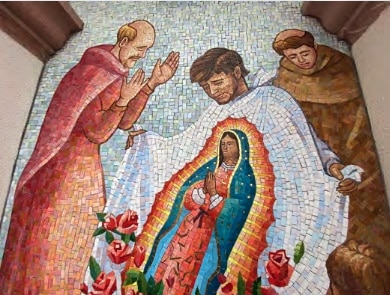
How often do we, like Juan Diego, rush about our business thinking we need to save ourselves? How often do we worry not only that God won’t answer our prayers but that following him will make everything harder? And how much worse is it in Advent, when our list of preparations for our Christmas celebration dwarfs our list of preparations for the coming of the Christ child?
Still he loves us. Still he offers himself to us. Still he sends us his mother to be ours, to call us gently back to his side. No matter how we avoid him. No matter how we run from him. And St. Juan Diego reminds us that God is gentle with us even when we refuse to make time for him. On his feast day (or a few days later on the feast of Our Lady of Guadalupe on Dec. 12), take a step back from the noise of this season and re-evaluate: How can you refocus your Advent on the Christ child? What tasks can be set aside for a time or abandoned altogether? Which obligations are essential but can still be handed over to God instead of becoming an obstacle to prayer? Ask Our Lady of Guadalupe to be a mother to you now, as she was to Juan Diego (and to Juan Bernardino, too).
Dec. 16
Blessed Paul Thoj Xyooj
For those who have been wounded by the Church
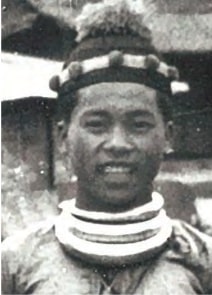
There are far too many people who have been deeply hurt by those who speak in the name of Jesus, particularly by priests and bishops. If you haven’t had such an experience, praise the Lord! But you almost certainly have a loved one who has good reason to be suspicious of or bitter toward the Catholic Church. Those are valid reactions — and yet, God is still good, whatever his representatives may do or say, and life in him is always better than life apart from him.
If you’re struggling to remain in the Church this Advent, you might need to spend some time with Blessed Paul Thoj Xyooj (1941-60, pronounced Tao Shiong). Xyooj was an evangelical prodigy who was doubted, betrayed, abandoned and ignored. And still he remained faithful unto death.
The son of a Hmong village chief in Laos, Xyooj was a teenager when he went out as a missionary, accompanying a priest who spoke no Hmong. When they arrived, Xyooj was so handsome and well-dressed that people stared in wonder. They were enthralled by his preaching, listening for three days and three nights; 400 people asked to be prepared for baptism.
Xyooj was incredibly successful for seven months. Then he was suddenly recalled. His superiors worried about what he was preaching. How could he possibly make the Gospel sound so appealing that people were accepting it in such numbers? Had he watered it down? Ignored the hard teachings? And wasn’t he too friendly with the young women in the village? Surely he was taking advantage of them.
So Xyooj was torn from the people who had become like family to him and from the young woman he had hoped to marry. Because of rumors and unfounded suspicions.
He returned to his home village and tried to move on. He searched for a wife, but none had a heart for Jesus the way his beloved had. The Church refused to let him do the work he was so good at, to marry as he pleased, or to live where he pleased. He was lost and confused.
Xyooj didn’t lose his faith in Jesus or in the Church, though for a time he lost his place in the Church and his faith in the men who ran it. But Blessed Mario Borzaga believed in him. An Italian priest, he was going to preach to a Hmong village and asked Xyooj to join him. Though he had been so deeply hurt by the Church and by other priests, Xyooj knew Jesus. He wanted his people to know Jesus, too. So he went.
The pair set off but were ambushed by communist insurgents. They offered Xyooj his life, but he who had been betrayed by European priests refused to abandon this one. He died alongside Blessed Mario, no longer lost and betrayed but crowned with glory.
If you’ve been wounded by Catholics — especially by priests — it’s okay to feel conflicted, even to feel angry and hurt and entirely disinclined to return to Mass this Christmas. Ask Blessed Paul Thoj Xyooj to pray for your healing. Ask him to pray alongside you, that you would be able to know the goodness of God and the powerful love of Jesus even when his representatives fail to show it.
Dec. 19
Blessed Anna Yi Si-im
For those whose lives have been derailed
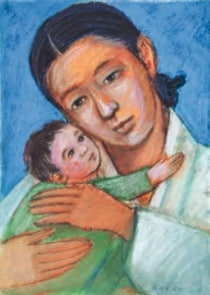
The holidays can be difficult for everyone, but especially for those whose lives have been derailed by divorce or abuse, by unexpected pregnancies or widowhood, by the need to limit contact with family members. Memories of traumatic Christmases past might trigger flashbacks while beautiful memories might bring our grief to the forefront once more. Then there are the thousand curated images of perfect Christmases that remind us what we don’t have, what we’ll never have, that fill us with guilt over what we haven’t been able to give to our children. It’s a lot.
Blessed Anna Yi Si-im (1782-1816) understands it all. Anna and her family converted to Catholicism when she was young, renouncing their wealth and high social status in order to follow Christ at a time when many in Korea were being killed for their faith. They weren’t united in this, though; her father refused to convert for many years, even cursing his family for all that their faith had cost him. Though he eventually became Catholic, Anna had many years of memories that needed healing. But she also had a mother and brother whose faith had strengthened her; her brother went on to be martyred a decade after Anna’s death and is himself a Blessed: Blessed John Yi Seong-ji.
Anna discerned a call to consecrated life, though she knew that remaining unmarried would draw unwelcome attention from the anti-Catholic government. But she had heard of a community of Catholic virgins and made up her mind to move there. She arranged transport with a Catholic boatman named Pak. But as soon as Pak had Anna alone, he “forced her to marry him and she gave birth to their son”; given that a marriage contracted through force is no marriage at all, the euphemism seems to indicate that Pak assaulted Anna, either before or after pressuring her into a sham marriage that she desperately wanted to avoid.
Anna found herself married against her will, a mother though she had hoped to remain a virgin. And then her husband died, leaving her a single mother. Certainly Anna must have had moments of anger and grief when she considered what had been done to her. But Anna knew that holiness doesn’t come in the “what ifs” but in the “what nows.” So she moved to a Christian village, finally finding the supportive community she had sought all those years ago. When the persecutions intensified, Anna and her son, Jong-ak, were arrested for their faith and sent to a prison where they remained for several years. It was there that Jong-ak died in his mother’s arms.
Even then, Anna remained faithful. She mourned the loss of her son but allowed her pain to drive her deeper into the Sacred Heart of Jesus rather than turning her back on him. She trusted God even in the midst of a life she would never have chosen — trusted him enough to persevere unto martyrdom.
During this final week before Christmas, it’s easy to be overwhelmed by all the ways our lives are not what we’d hoped, all the ways our reality doesn’t measure up to the Hallmark Christmas movies. Spend some time this week asking the intercession of Blessed Anna Yi Si-im, that you would be able to trust that God is good even when your life is not.
Meg Hunter-Kilmer is the author of “Saints Around the World” (Emmaus Road Publishing, $22.95).
